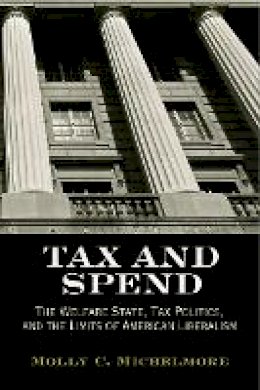
Tax and Spend: The Welfare State, Tax Politics, and the Limits of American Liberalism
Molly C. Michelmore
Taxes dominate contemporary American politics. Yet while many rail against big government, few Americans are prepared to give up the benefits they receive from the state. In Tax and Spend, historian Molly C. Michelmore examines an unexpected source of this contradiction and shows why many Americans have come to hate government but continue to demand the security it provides.
Tracing the development of taxing and spending policy over the course of the twentieth century, Michelmore uncovers the origins of today's antitax and antigovernment politics in choices made by liberal state builders in the 1930s, 1940s, and 1950s. By focusing on two key instruments of twentieth-century economic and social policy, Aid to Families with Dependent Children and the federal income tax, Tax and Spend explains the antitax logic that has guided liberal policy makers since the earliest days of Franklin Roosevelt's presidency. Grounded in careful archival research, this book reveals that the liberal social compact forged during the New Deal, World War II, and the postwar years included not only generous social benefits for the middle class—including Social Security, Medicare, and a host of expensive but hidden state subsidies—but also a commitment to preserve low taxes for the majority of American taxpayers.
In a surprising twist on conventional political history, Michelmore's analysis links postwar liberalism directly to the rise of the Republican right in the last decades of the twentieth century. Liberals' decision to reconcile public demand for low taxes and generous social benefits by relying on hidden sources of revenues and invisible kinds of public subsidy, combined with their persistent defense of taxpayer rights and suspicion of "tax eaters" on the welfare rolls, not only fueled but helped create the contours of antistate politics at the core of the Reagan Revolution.
Product Details
About Molly C. Michelmore
Reviews for Tax and Spend: The Welfare State, Tax Politics, and the Limits of American Liberalism
The New Yorker
"Anyone wanting to grasp today's predicament should consult this incisive, disheartening, vivid, and informed road map to fiscal hell."
Journal of American History
"Molly C. Michelmore's outstanding book contributes to this rich and innovative literature by exploring how the development of national tax and spending policies from the New Deal to the Reagan revolution laid the foundation for and ultimately drove the rightward shift in American politics. In this well-researched and elegantly written study, Michelmore makes the powerful and plausible claim that the demise of the New Deal order was rooted in the historically specific policy choices and judgments made during the crises of the Great Depression and World War II."
American Historical Review
"A powerful analysis of the way the language of taxes and rights shapes the modern welfare state. Tax and Spend makes a significant argument about the nature of postwar liberalism through an examination of issues that have generally not been treated together."
Kimberly Phillips-Fein, author of Invisible Hands: The Making of the Conservative Movement from the New Deal to Reagan
"Tax and Spend connects two arenas of policy history that stand apart to the detriment of both: the history of fiscal policy and that of social assistance. It traces the complicity of liberalism in our anti-tax regime. This most important book has the potential to transform how we think about the historical origins of the current crisis of the welfare state."
Eileen Boris, University of California, Santa Barbara
